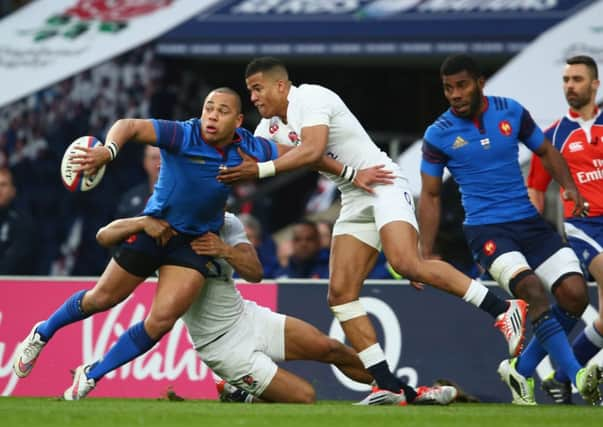Champagne won’t flow so freely in Rugby World Cup


So of course they had to chase the game from the start. More remarkably however the French chose to co-operate. Stung perhaps by the criticism of their “boring” rugby, fly-half Jules Plisson tried to run the first ball he received. His wild pass went astray, and was eagerly snapped up by England’s Ben Youngs – 7-0 to England before latecomers had settled in their seats. And it went on like that; tries run in from deep and from improbable positions. It was Barbarians-style rugby but in a match when the result really mattered as it hasn’t done in Barbarians games for donkey’s years.
Afterwards, it was tempting to think: this is how marvellous the game is when both teams want to play rugby. Yet of course there is more than one way to play rugby when the result is impotant. The score in the last World Cup final was New Zealand 8 France 7, and none of the World Cup finals , except perhaps the first in 1987, has been a try-fest. I wouldn’t look for one this autumn either. Twelve tries were scored at Twickenham last week. I’ll be astonished if there is a quarter of that number in this year’s final there.
Advertisement
Hide AdAdvertisement
Hide AdSuppose Saturday had been the World Cup semi-final. Would Plisson have thrown out that rash pass? Surely not; he would have kicked deep into the England half, playing for territory. But, if he had, and England had gone 7-0 up immediately, would they have continued to play the wide, running-and-handling game, or would they have consolidated, keeping play deep in French territory?
As it was, conscious of the required margin of victory, they continued to attack – and so allowed France to score tries from deep on the counter-attack, and even take the lead. This made English audacity all the more necessary…
Something similar happened at Murrayfield. Ireland, aware of the target Wales has set in the first match of the afternoon, did what they hadn’t done all tournament, and moved the ball wide almost immediately. They too were rewarded by an early try.
But one wonders how different all three matches might have been if they had all kicked off at the same time. As it was, the staggered kick-offs made for a marvellously exciting and, in general, enjoyable afternoon. It was also of course an unusual one: where were the blanket defences strung across the field? Absent, gone missing, everywhere. Three weeks previously in Dublin, in what was also an outstanding and riveting match, Ireland had squeezed England dry.
Arguably, that game offered a better indicator of both teams’ World Cup chances than anything last Saturday. I suggested the other day that Stuart Lancaster’s England with the advantage of playing at home, are capable of winning the World Cup. So they are, but, if they are to do so, they will have to win games more like the one they lost in Dublin than one played in the glorious free-flowing style of the French match. Barbarians-style rugby requires the co-operation of the opposition, and such co-operation is unlikely to be forthcoming in the autumn.
What we saw on Saturday was the equivalent of limited-overs cricket in which the unfortunate bowlers are often mere cannon-fodder. But the World Cup will be more like Test cricket where batsmen are under a different sort of pressure and where bowlers often dominate.
After the Twickenham game the somewhat mouthy England full-back Mike Brown, subject earlier of a well-merited order to shut up from referee Nigel Owens, thanked the French for playing as they did, and meanly complained that in contrast neither Italy nor Scotland had bothered to turn up, thus, he implied, costing England the title.
This was ungenerous, and also nonsense. Italy after all were leading Wales until just before half-time: Scotland, going into the break 10-20 down were still in the match then. If both teams were overwhelmed in the second half, this was as attributable to the excellence of Wales and Ireland as to their own deficiencies.
Advertisement
Hide AdAdvertisement
Hide AdAnd after all, England might indeed have been champions if Jamie Heaslip’s tackle hadn’t prevented Stuart Hogg from grounding the ball for a late try, and if Sam Hidalgo-Clyne had then kicked the conversion from wide-out.
On the other hand, they mightn’t have come as close as they did if Nigel Owens had referred Billy Vunipola’s try to the TMO, because the TV pictures suggested that, just like Stuart Hogg, he had actually lost control and dropped the ball before falling on it.
A thought to put Scotland’s season in perspective. This is the best England team since 2003, perhaps the best Wales team since the 1970s and the best Ireland one since the 1940s. So it’s no disgrace to lose to any of them.
What is now needed is for Vern Cotter to mould the best Scotland team since 1999; I believe he has the material to do so.
FOLLOW US
SCOTSMAN TABLET AND MOBILE APPS